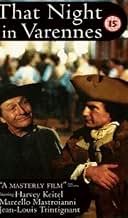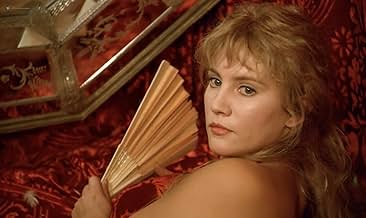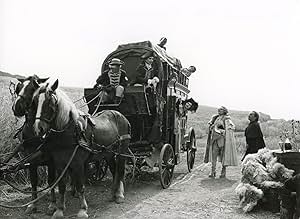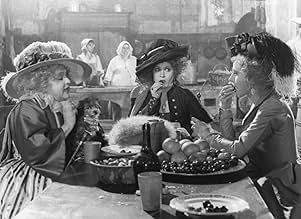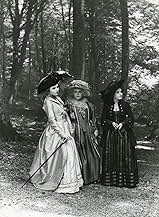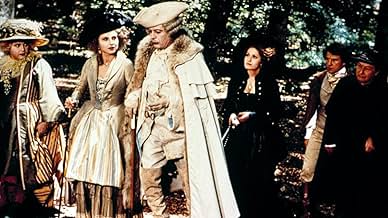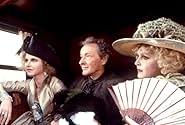VALUTAZIONE IMDb
7,2/10
2648
LA TUA VALUTAZIONE
Nel giugno del 1791, un gruppo di passeggeri su una diligenza si ritrova coinvolto negli eventi della Rivoluzione francese, quando si trovano nella città di Varennes nel momento in cui i riv... Leggi tuttoNel giugno del 1791, un gruppo di passeggeri su una diligenza si ritrova coinvolto negli eventi della Rivoluzione francese, quando si trovano nella città di Varennes nel momento in cui i rivoluzionari arrestano il re Luigi in fuga.Nel giugno del 1791, un gruppo di passeggeri su una diligenza si ritrova coinvolto negli eventi della Rivoluzione francese, quando si trovano nella città di Varennes nel momento in cui i rivoluzionari arrestano il re Luigi in fuga.
- Regia
- Sceneggiatura
- Star
- Premi
- 6 vittorie e 16 candidature totali
Recensioni in evidenza
After having been annoyed by the candy cane music video of Coppola's "Marie Antoinette," I went in search of this film again. I had remembered liking "La Nuit de Varennes" when it came out, but 25 years later it looks much, much better.
A hostile person once defined French film as people saying wounding things to each other for an hour and a half, then somebody dies of cancer or a gunshot. This film redeems the stereotype, as people say wounding things to each other for over two hours and nobody dies (on camera, anyway).
Imagine "Stagecoach" with politics instead of Catholic redemption, then add a solid, witty script and great acting. Veterans Barrault and Mastroianni give canny, memorable performances and everybody else is just fine.
If your model for the movies is the roller-coaster or the video game, you will scream in agony. If you would prefer not to be insulted, this film will be balm for the soul.
Since the powers that be have decreed that this film shall fall between the cracks, it's worth a little research to find it on DVD. Google "That Night in Varennes" and check the first dozen results. It's the best we can do until the delinquent owners of the film come to their senses.
A hostile person once defined French film as people saying wounding things to each other for an hour and a half, then somebody dies of cancer or a gunshot. This film redeems the stereotype, as people say wounding things to each other for over two hours and nobody dies (on camera, anyway).
Imagine "Stagecoach" with politics instead of Catholic redemption, then add a solid, witty script and great acting. Veterans Barrault and Mastroianni give canny, memorable performances and everybody else is just fine.
If your model for the movies is the roller-coaster or the video game, you will scream in agony. If you would prefer not to be insulted, this film will be balm for the soul.
Since the powers that be have decreed that this film shall fall between the cracks, it's worth a little research to find it on DVD. Google "That Night in Varennes" and check the first dozen results. It's the best we can do until the delinquent owners of the film come to their senses.
10rab-int
We really enjoyed this. Barrault and Mastroianni are terrific actors--did an outstanding job. The philosophical questions raised are still worth considering today, as the movie implies, and yet they are raised in an interesting and indirect way, so the viewer doesn't feel bludgeoned or lectured at.
I was interested to discover that the flight to Varennes was in fact historical, though I could not discover whether Restif de Bretonnes (Barrault's character) was actually at the event and commented on first-hand knowledge. He did write extensively about life and events of the time. The interchange of ideas seemed natural, despite the apparent absurdity of finding all of them in the same coach at the same time. Sort of like those "if you could invite 5 historical figures to dinner at the same time" ideas.
Very much worth seeing.
I was interested to discover that the flight to Varennes was in fact historical, though I could not discover whether Restif de Bretonnes (Barrault's character) was actually at the event and commented on first-hand knowledge. He did write extensively about life and events of the time. The interchange of ideas seemed natural, despite the apparent absurdity of finding all of them in the same coach at the same time. Sort of like those "if you could invite 5 historical figures to dinner at the same time" ideas.
Very much worth seeing.
Besides boasting wonderful performances by two of my favourite actors (Marcello Mastroianni and Harvey Keitel), Il Mondo Nuovo (as it's known in Italy) by acclaimed Italian director Ettore Scola is to me as satisfying as a good classic novel, one of those 800-page tomes you approach with a little trepidation and then remember for years to come, wishing other novels you read would compare.
It's the year 1791 and on board a stagecoach, an assortment of characters from different parts of the world are traveling from Paris to Verdun. Along the way the coach picks up the aging (his character is 67 years old in the film), legendary Venetian seducer Giacomo Casanova, as well as the controversial, fawn-like but ahead-of-his-time chronicler and novelist, Restif de la Bretonne. The stagecoach's original travelers include the American Revolution survivor Thomas Paine (Keitel), as well as a melancholic and reserved widow aching to fall in love again, a beautiful and intelligent yet devoutly Monarchist Austrian Countess, a sharp and cheeky Italian opera singer eternally clutching a pet poodle and poking fun at her dim and bigoted husband, as well as a cocky young Jacobean. The coach also includes their servants, among whom the young Countess's devoted butler and her pretty African maid, who soon hooks up with the young Jacobean. Not far ahead of them, another stagecoach carrying the fleeing French royal family - Louis XVI, Marie Antoinette and their children is also traveling along the same road, unaware this will be the route to their irrevocable death sentence.
The story is told through the dialogues and anecdotes of a group unaware of their status as main witnesses to what will turn out to be one of history's most pivotal moments. Besides the breathtakingly authentic feel of the time - you really feel like you've stepped into a Hogarth painting - what's most remarkable is how you also get the sense such historic events are happening in real time, so convincing are the reactions of bewilderment and astonishment on the character's part. A series of vignettes, made delicious by the top-class characterisation and dialogue, contribute to moving the plot along as well as giving the viewer some light relief which however never loses sight of the breathless atmosphere of those revolutionary times.
Mastroianni as the self-deprecating, tired, aging Casanova is a treat from the very first frame he graces to the last. This legendary actor has always brought a unique depth of humanity to his roles, but despite all the other fine actors and characters in this film I just couldn't have imagined it without him. I adored the moment, after having charmed all the ladies and even some of the men on the stagecoach, Casanova kisses the young Austrian Countess's besotted gay butler on the lips and as a parting shot says: "I don't exclude anything on principle."
Especially memorable are the final frames of the film, in which the young Austrian Countess and her butler, after having dressed a wooden dummy in a spartan inn room with the doomed king's ceremonial costume, bow down to it with devotion, symbolising the ephemeral and temporal nature of an earthly kingdom. Some will consider this Italo-French production overlong, others won't be fond of its un-Hollywoodlike approach to the historic genre, others will even consider some of its characters unappealing. On my part I consider these the film's strengths and cannot help but warmly recommending it. My only real complaint is: why hasn't it yet been released on DVD?
It's the year 1791 and on board a stagecoach, an assortment of characters from different parts of the world are traveling from Paris to Verdun. Along the way the coach picks up the aging (his character is 67 years old in the film), legendary Venetian seducer Giacomo Casanova, as well as the controversial, fawn-like but ahead-of-his-time chronicler and novelist, Restif de la Bretonne. The stagecoach's original travelers include the American Revolution survivor Thomas Paine (Keitel), as well as a melancholic and reserved widow aching to fall in love again, a beautiful and intelligent yet devoutly Monarchist Austrian Countess, a sharp and cheeky Italian opera singer eternally clutching a pet poodle and poking fun at her dim and bigoted husband, as well as a cocky young Jacobean. The coach also includes their servants, among whom the young Countess's devoted butler and her pretty African maid, who soon hooks up with the young Jacobean. Not far ahead of them, another stagecoach carrying the fleeing French royal family - Louis XVI, Marie Antoinette and their children is also traveling along the same road, unaware this will be the route to their irrevocable death sentence.
The story is told through the dialogues and anecdotes of a group unaware of their status as main witnesses to what will turn out to be one of history's most pivotal moments. Besides the breathtakingly authentic feel of the time - you really feel like you've stepped into a Hogarth painting - what's most remarkable is how you also get the sense such historic events are happening in real time, so convincing are the reactions of bewilderment and astonishment on the character's part. A series of vignettes, made delicious by the top-class characterisation and dialogue, contribute to moving the plot along as well as giving the viewer some light relief which however never loses sight of the breathless atmosphere of those revolutionary times.
Mastroianni as the self-deprecating, tired, aging Casanova is a treat from the very first frame he graces to the last. This legendary actor has always brought a unique depth of humanity to his roles, but despite all the other fine actors and characters in this film I just couldn't have imagined it without him. I adored the moment, after having charmed all the ladies and even some of the men on the stagecoach, Casanova kisses the young Austrian Countess's besotted gay butler on the lips and as a parting shot says: "I don't exclude anything on principle."
Especially memorable are the final frames of the film, in which the young Austrian Countess and her butler, after having dressed a wooden dummy in a spartan inn room with the doomed king's ceremonial costume, bow down to it with devotion, symbolising the ephemeral and temporal nature of an earthly kingdom. Some will consider this Italo-French production overlong, others won't be fond of its un-Hollywoodlike approach to the historic genre, others will even consider some of its characters unappealing. On my part I consider these the film's strengths and cannot help but warmly recommending it. My only real complaint is: why hasn't it yet been released on DVD?
French novelist Catherine Rihoit is also an accomplished biographer and there are certainly biographical elements here. It approaches the realms of fantasy however to imagine that notorious adventurer and chronicler Giacomo Casanova, lecher/pornographer Restif le Bretonne and American revolutionary Thomas Paine would all be passengers on the same 'diligence' that is just a few hours behind the one which is carrying the French Royal Family in its desperate flight to Varennes.
This film of Ettore Scola is so splendidly realised and acted that the anomaly doesn't seem to matter and comes under the heading of 'artistic license'.
It is certainly nothing less than 'artistic' with sumptious cinematography by Armando Nannuzzi, superlative production design by Dante Ferretti and understated score by Armando Trivaioli, all of whom are masters of their craft and who have worked with some of best directors in the business.
The legendary Sergio Amidei who died before the film was released, has contributed to the screenplay and among those privileged to speak his dialogue are Marcello Mastroianni as Casanova, Jean-Louis Barrault as Restif and Hanna Schygulla as a Countess who is also a lady in waiting to Marie Antoinette. Her presence on the the same coach is therefore more plausible.
This talented trio are absolutely mesmerising. Barrault's film appearances are rare as he was primarily a stage actor and director who ran his own theatre company with his wife Madeleine Renaud. The fascinating Miss Schygulla has the distinction of having survived the making of numerous films with Fassbinder. It is the performance of Mastroianni as raddled, dissipated Casanova that lingers longest. He has reached that sublime state when he has ceased to act at all and simply 'is'. Harvey Keitel as Paine has been cast for the benefit of the North American market and is 'dubbed' as one would expect. He is a wee bit young for the role as Paine would have been in his late fifties at this time.
The post-synchronisation, always a hit-and-miss affair in Italian cinema, is generally very good.
There is a delightful scene where Casanova sings a few bars of Leporello's 'catalogue' aria from Mozart's 'Don Giovanni'. Legend has it that Casanova helped da Ponte with the libretto. Perhaps he was also 'technical advisor'!
A beautifully made film that just sustains its running time and typifies both the traditional excellence of European costume drama and its preference for character over plot. Not to mention its appeal to a more literate audience.
Although politically Ettore Scola does not appear to take sides, all that we see of Louis XV1 and Marie Antoinette are their lower legs and feet whereas there are plentiful close-ups of the downtrodden peasantry.
This director has always been fascinated by history and the part played by 'ordinary' citizens. "The flow of history lies with us" he once said.
This film of Ettore Scola is so splendidly realised and acted that the anomaly doesn't seem to matter and comes under the heading of 'artistic license'.
It is certainly nothing less than 'artistic' with sumptious cinematography by Armando Nannuzzi, superlative production design by Dante Ferretti and understated score by Armando Trivaioli, all of whom are masters of their craft and who have worked with some of best directors in the business.
The legendary Sergio Amidei who died before the film was released, has contributed to the screenplay and among those privileged to speak his dialogue are Marcello Mastroianni as Casanova, Jean-Louis Barrault as Restif and Hanna Schygulla as a Countess who is also a lady in waiting to Marie Antoinette. Her presence on the the same coach is therefore more plausible.
This talented trio are absolutely mesmerising. Barrault's film appearances are rare as he was primarily a stage actor and director who ran his own theatre company with his wife Madeleine Renaud. The fascinating Miss Schygulla has the distinction of having survived the making of numerous films with Fassbinder. It is the performance of Mastroianni as raddled, dissipated Casanova that lingers longest. He has reached that sublime state when he has ceased to act at all and simply 'is'. Harvey Keitel as Paine has been cast for the benefit of the North American market and is 'dubbed' as one would expect. He is a wee bit young for the role as Paine would have been in his late fifties at this time.
The post-synchronisation, always a hit-and-miss affair in Italian cinema, is generally very good.
There is a delightful scene where Casanova sings a few bars of Leporello's 'catalogue' aria from Mozart's 'Don Giovanni'. Legend has it that Casanova helped da Ponte with the libretto. Perhaps he was also 'technical advisor'!
A beautifully made film that just sustains its running time and typifies both the traditional excellence of European costume drama and its preference for character over plot. Not to mention its appeal to a more literate audience.
Although politically Ettore Scola does not appear to take sides, all that we see of Louis XV1 and Marie Antoinette are their lower legs and feet whereas there are plentiful close-ups of the downtrodden peasantry.
This director has always been fascinated by history and the part played by 'ordinary' citizens. "The flow of history lies with us" he once said.
10nicmart
I frankly don't find much value in movie reviews, amateur or professional, so I won't belabor my points. Simply put, this is the smartest film I've ever seen. A coherent plot and intelligent dialog are critical to my movie pleasure, and this one has them. It is so good that it is almost novelistic, which is not to say that it could have been taken from a novel. Some review guide said of this movie that it is "talk, talk, talk." Exactly! The conversations are witty, charming, and often funny. Be advised that this is not akin to the insipid "My Dinner With Andre," with its metaphysical posturing. One must say this carefully about any movie, but there are actually things to learn from this film, though it is far more entertaining than didactic. The acting is mature and magnificent. I doubt that Mastroianni was ever in a better role. Jean-Louis Barrault and Hanna Schygulla are brilliant. This, along with his other excellent films, should have made director Scola one of the titans of modern cinema. Instead it has never made it to DVD and you will be fortunate to ever see it. (Update: It is now available as an all- region Blu-Ray.)
Lo sapevi?
- QuizHarvey Keitel's voice was dubbed in the movie.
- Versioni alternativeOriginal French-language version runs 150 minutes. The version released theatrically in the USA removes 17 minutes of footage.
- ConnessioniFeatured in Marcello Mastroianni: mi ricordo, sì, io mi ricordo (1997)
I più visti
Accedi per valutare e creare un elenco di titoli salvati per ottenere consigli personalizzati
- How long is That Night in Varennes?Powered by Alexa
Dettagli
- Data di uscita
- Paesi di origine
- Lingue
- Celebre anche come
- That Night in Varennes
- Luoghi delle riprese
- Pont Saint-Michel, Paris 1, Parigi, Francia(bridge in Paris)
- Aziende produttrici
- Vedi altri crediti dell’azienda su IMDbPro
- Tempo di esecuzione2 ore 30 minuti
- Mix di suoni
- Proporzioni
- 1.66 : 1
Contribuisci a questa pagina
Suggerisci una modifica o aggiungi i contenuti mancanti

Divario superiore
By what name was Il mondo nuovo (1982) officially released in Canada in English?
Rispondi

